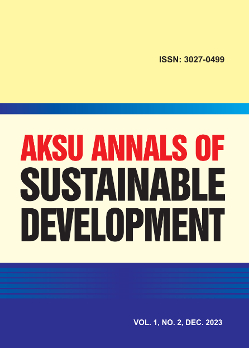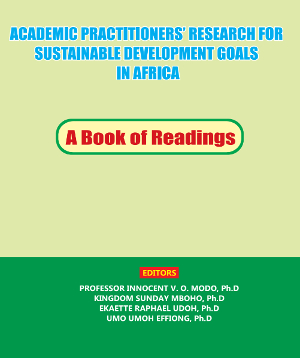CYBERCRIME AND NIGERIA'S DIPLOMACY REPUTATION IN DIASPORA
DOI:
https://doi.org/10.60787/AASD-v2i1-34Keywords:
Cybercrime, internet, diaspora, scammers, Nigeria imageAbstract
Cyberspace and its facilities have over the years become an indispensable tools that fast tract the growth
of modern societies which Nigerian is not an exemption. Sadly, it has also become an avenue through
which Nigeria loses her integrity, reputation and trust in the global sphere because of some illicit
activities perpetuated by some Nigerians. This study examined cybercrime and its implications on
Nigeria’s image in diaspora. Exploratory research method was used in the study and data were obtained
exclusively from secondary sources. Edwin Sutherland’s Differential Association theory was adopted as
the study’s theoretical framework. Finding indicates that cybercrime has become a prevalent
phenomenon in Nigeria where some Nigerian youths indulged in to harness wealth using cyber tools. It is
also reveals that Nigeria’s image has been greatly tarnished in the international community due to
activities of few Nigerians who engage in cybercrime. Accordingly, the study recommends, amongst
others, that adequate cyber securities should be put in place by government authorities responsible for
cyber technology, and that the current legislation on cybercrime should be enforced through proper
equipping of the anti-graft agencies.
Downloads
References
Abah, P. (2000). Nigeria: Family wants N300m
from Indonesia Govt. P. M. News.
Academic community. JAAS XXXII, 1-2.
Brill, Leiden.
Adaramola, Z. (2023, December 28). How Cyberattacks exposed Nigeria’s IT Security
Vulnerability In 2023. Daily Trust.
Adejoh, S., Alabi, T., Adisa, W., & Emezie, M.
(2019). Yahoo boys phenomenon in Lagos
metropolis: A qualitative investigation.
International Journal of Cyber
Criminology, 13(1), 1–20.
Adeniran, I. (2008). The Internet and Emergence
of Yahoo-Boys Sub-Culture in Nigeria.
International Journal of Cyber Criminology
(2), 368–381.
Alhaji, B., Hassan, A.,& Mohammed, J.(2016).
Information and communication
technology, cybercrime and the
administration of criminal justice system
in Nigeria. In Yusuf, Y.M. (ed.) Current
themes on Nigerian law and practice.
Maiduguri: University of Maiduguri,
Chapter 25, pages 416-431.
Alkaabi, A., & Obaid, S. (2010). Combating
computer crime: an international
perspective, (Doctoral Thesis on
Information Security Institute, Faculty of
Science and Technology, Queensland
University of Technology).
Ani, L. (2011). Cybercrime and national security:
the role of the penal and procedural law.
Law and Security in Nigeria, 200-202.
Atairet, A. C. & Ndaeyo, E., (2022) Grievances
Redress Procedure and Job Retention in
Nigerian Civil Service – An Appraisal.
AKSU Journal of Administration and
Corporate Governance 2(3)
Atairet, A.C (2020) Implementation of Local
Economic Empowerment Strategy (LEEDS)
in the health and Education Sectors. Akwa
Ibom state, Nigeria- An Assessment.
International Journal of Technical
Research & Science. Vol. X
Atairet, A.C (2023). An Assessment of the
Administrative Ethics Sustainable Service
Delivery in Akwa Ibom State Civil Service,
Nigeria.
http://www.researchgate.net/publication
/378691769
Brown S., Esbensen F.,& Geis, G.(2001).
Criminology: Explaining crime and its
context 4th edition: Cincinnati, OH,
Anderson publishing Co.
Bukola A., Ibeh R., & Sivowaku B. (2023,
November 27). Fintech: Nigerian Lose
N51bn to Cybercriminals. Leadership
News online.
http://www.leadershipnews.com/fintech/
Chinedu A. (2019, March 18). Nigeria ranked 16th
in FBI global cybercrime victims report.
The Cable. www.thecable.ng
Cohen, R. (1995). Rethinking 'Babylon':
Iconoclastic Conceptions of the Diasporic
Experience. New Community, 15.
Daniel, E. (2015). Cybercrime in Ghana A Study of
Offenders, Victims and the Law. Doctoral
dissertation, University of Ghana.
Dennis, M. (2014). Cybercrime. In Encyclopaedia
Britannica. Retrieved from
http://www.britannica.com/EBchecked/t
opic/130595/cybercrime.
Ekemezie, W., & Ngene, N. (2004). Computer and
Information Technology. Enugu: Kinsman
Erezi, D. (2020, July 3). Hushpuppi conspired to
defraud Premier League Club of $124
million. The Guardian News.
Ezeani, C. (2010). Information Communication
Technology: An Overview. In Evarest C.
Madu and Chinwe Nwogo Ezeani (Eds.)
Modern Library and Information Science
for Information Professionals in Africa.
Eze-Michael & Ezedikachi. N. (2021). Internet
Fraud and its Effect on Nigeria’s Image In
International Relations. Covenant Journal
of Business & Social Sciences (CJBSS), Vol.
No.1, June, 2021
Fidrus, M., (2004). Judicial review for Nigerian on
death row begins. Jakarta Post.
George, G. (2023, April 2). Bank customers,
companies lose billions to Nigeria’s weak
cybersecurity. Punch Newspaper.
Hassan, A., Lass, F., & Makinde, J. (2012).
Cybercrime in Nigeria: causes, effects and
the way out. ARPN Journal of Science and
Technology, 2(7), 626-631.
Ige, O. (2008). Secondary school students’
perceptions of incidences of Internet
crimes among school age children in Oyo
and Ondo States, Nigeria. A Master
dissertation in the Department of Teacher
Education, University of Ibadan.
Iroanusi Q. (2022, October 27). Over 2,800
persons convicted of cybercrime in 2022.
Premium Times Online News.
https://www.premiumtimes.com/news
Jakarta Post, (2003). On advance fee fraud. The
displacement of the Nigerian. Jumare,
I.M., 2001
Kanayo, K. (2024, February 7). Question source of
your children’s wealth. Daily Post
Newspaper.
dailypost.ng/2024/02/07/questionsource-of-your-childrens-wealth-kanyo-okanayo-warns-parents.
Kejal V. (2011) Cybercrime & its Categories: Indian
Journal of Applied Research. Retrieved
from
https://www.researchgate.net/publicatio
n/274652160
Kotler, P (1997), Marketing Management:
Analysis. Planning, Implementation and
Control, New Helhi: Prentice Hall Inc.,
Longe, O.(2004): Proprietary Software Protection
and Copyright issues in contemporary
Information Technology. (M.Sc. Thesis)
Unpublished. Federal University of
Technology, Akure, Nigeria.
Mboho, K.S. and Udoh, U.S. (2014). Resource
control: A panacea a for sustainable
peace and development in the Niger Delta
Region of Nigeria. IOSR journals –
international organization of scientific
research, Journal of Business and
Management, Vo. l16,
pp. 33-38.
Mboho, K., and Effiong, U. (2024). Social Values,
Negative Attitudes and Conducts in
Nigeria. In: I.V.O. Modo and Kingdom
Sunday Mboho (Eds). The Perspective of
Nigerian Peoples and Culture. ICIDR
Publishing House, Ikot Ekpene.
Meke, E. (2012). Urbanization and Cyber Crime in
Nigeria: Causes and Consequences.
European Journal of Computer Science
and Information Technology, 3(9), 1-11.
Ninalowo, A. (2016). Nexus of state and
legitimation crisis. Lagos: Prime
Publications.
Nlerum, F. E.; Okorie, N. U. (2012). Youth
participation in rural development: The
way forward. Spanish Journal of Rural
Development, 3,(1), p. 1
Obiri, N. (2015). An Investigation of Youth in
Cybercrime in the Ayawaso East
Constituency of Greater Accra (Doctoral
dissertation, University of Ghana).
Okeshola, F., & Abimbola, K. (2013). The nature,
causes and consequences of cybercrime
in tertiary institutions in Zaria-Kaduna
state of Nigeria. American International
Journal of Contemporary Research, 3(9),
-114.
Olowolagba F. (2020, June 13). Interpol breaks
silence on Hushpuppi arrest, reveals next
action. Daily Post News.
Safran, W. (1991). Diasporas in Modern Societies:
Myths of Homeland and Return. A Journal
of Transnational Studies, 2,3.
Shehu, A. (2014). Emerging Issues in Cyber-Crime:
Causes, Implications and Effects for the
Legal Profession. Online Journal of Social
Sciences Research, 3 (7), pp 169-180.
Smith, R., Grabosky, P., & Urbas, G. (2004). Cyber
criminals on trial. Criminal Justice
Matters, 58(1), 22-23.
Sulaiman L., Ishowo, L.& Muhammed, A. (2016).
Cybercrime and Nigeria’s External Image:
A Critical Assessment Africology: The
Journal of Pan African Studies, vol.9, No.6.
Warner, J. (2011). Understanding cyber-crime in
Ghana: A view from below. International
Journal of Cyber Criminology, 5(1), 736.
Whitty, M., & Buchanan, T. (2012). The
Psychology of the Online Dating Romance
Scam. A Report for the ESRC. available
online at www2. le. ac.
uk/departments/media/people/monicawhitty/Whitty_romance_scam_report.pdf.
Downloads
Published
Issue
Section
License
Copyright (c) 2024 AKSU Annals of Sustainable Development

This work is licensed under a Creative Commons Attribution-NonCommercial-NoDerivatives 4.0 International License.
Manuscript content on this site is licensed under Creative Commons Licenses. Authors wishing to include figures, tables, or text passages that have already been published elsewhere are required to obtain permission from the copyright owner(s) for both the print and online format and to include evidence that such permission has been granted when submitting their papers. Any material received without such evidence will be assumed to originate from the authors.





 ICIDR Publishing House
ICIDR Publishing House